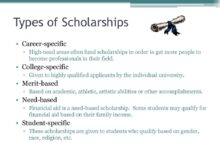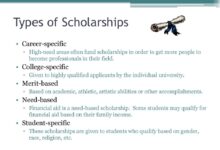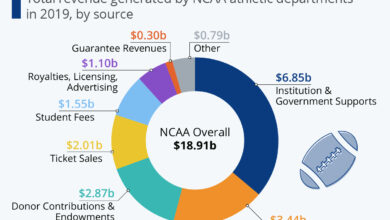Scholarships Every Masters Student Should Know About – Top Scholarships, Tips, And Application Process
Scholarships Every Master’s Student Should Know About provides a comprehensive guide to the top scholarships available for Master’s students, along with valuable tips on how to secure them and navigate the application process effectively. From merit-based to field-specific scholarships, this article covers everything you need to know to fund your graduate education successfully.
General Overview of Master’s Scholarships
Master’s scholarships play a crucial role in supporting students pursuing advanced degrees by providing financial assistance. These scholarships help alleviate the financial burden of graduate education, making it more accessible to a wider range of individuals.
List of Top Scholarships for Master’s Students:
- Fulbright Scholarship
- Rhodes Scholarship
- Chevening Scholarship
- Gates Cambridge Scholarship
- Erasmus Mundus Scholarship
Importance of Scholarships in Funding Graduate Education:
Scholarships for Master’s students are essential as they provide financial support that can cover tuition fees, living expenses, and other educational costs. They enable students to focus on their studies without the stress of financial constraints, allowing them to fully immerse themselves in their academic pursuits.
Eligibility Criteria for Master’s Scholarships:
- Academic merit: Most scholarships require a strong academic record and performance.
- Field of study: Some scholarships are specific to certain fields of study or disciplines.
- Research or project proposal: Certain scholarships may require a research proposal or project outline.
- Letters of recommendation: Applicants may need to submit letters of recommendation from professors or professionals in the field.
- Community involvement: Some scholarships value community service and extracurricular activities.
Merit-Based Scholarships
Merit-based scholarships are awarded to students based on their academic achievements, leadership skills, extracurricular activities, and other accomplishments, rather than financial need.
Types of Merit-Based Scholarships
There are several types of merit-based scholarships available for Master’s students:
- Academic Scholarships: Awarded based on GPA, standardized test scores, and academic achievements.
- Leadership Scholarships: Given to students who have demonstrated exceptional leadership skills and qualities.
- Extracurricular Scholarships: Awarded to students who have excelled in extracurricular activities such as sports, music, or community service.
- Research Scholarships: Granted to students with outstanding research work or publications.
Comparison of Different Merit-Based Scholarships
Each merit-based scholarship has its own criteria and requirements. Academic scholarships focus on GPA and test scores, while leadership scholarships emphasize qualities such as teamwork and communication. Research scholarships, on the other hand, prioritize research experience and publications. It is essential to carefully review the eligibility criteria for each scholarship to determine which ones align best with your strengths and accomplishments.
Tips to Increase Chances of Winning a Merit-Based Scholarship
- Start Early: Begin researching and applying for scholarships well in advance to meet deadlines.
- Highlight Achievements: Showcase your academic accomplishments, leadership roles, and extracurricular activities in your application.
- Write Strong Essays: Craft compelling essays that demonstrate your passion, goals, and why you deserve the scholarship.
- Obtain Strong Recommendations: Ask professors, employers, or mentors who know you well to write recommendation letters highlighting your strengths.
- Stay Organized: Keep track of deadlines, requirements, and application materials to submit a comprehensive and timely application.
Need-Based Scholarships
Need-based scholarships are financial aids provided to Master’s students based on their demonstrated financial need rather than academic or extracurricular achievements.
Key Characteristics of Need-Based Scholarships
Need-based scholarships prioritize students who require financial assistance to pursue their Master’s degree. These scholarships aim to bridge the gap between the cost of education and the student’s ability to pay for it.
Application Process for Need-Based Scholarships
When applying for need-based scholarships, students are typically required to submit financial documents such as tax returns, bank statements, and income verification. Deadlines for these scholarships vary, so it’s crucial to stay organized and submit all required documentation on time.
Organizations Offering Need-Based Scholarships for Master’s Students
- The Gates Foundation: Offers need-based scholarships to graduate students pursuing various fields of study.
- The Jack Kent Cooke Foundation: Provides scholarships for Master’s students with financial need to cover tuition, books, and other educational expenses.
Eligibility Criteria for Need-Based Scholarships vs. Merit-Based Scholarships
While merit-based scholarships focus on academic achievements, extracurricular activities, and leadership roles, need-based scholarships prioritize financial need. Students applying for need-based scholarships must demonstrate their financial situation through documentation, whereas merit-based scholarships often require academic transcripts and recommendation letters.
Writing a Compelling Personal Statement for Need-Based Scholarships
To write a compelling personal statement for need-based scholarships, students should focus on sharing their financial challenges, educational goals, and how receiving the scholarship will help them achieve their aspirations. It’s essential to be honest, heartfelt, and concise in conveying your story.
Demonstrating Financial Need in Scholarship Applications
It is crucial to effectively demonstrate financial need in scholarship applications by providing specific details about your financial situation, including any challenges or obstacles you have faced. Clearly explaining how receiving the scholarship will alleviate financial burdens and enable you to focus on your academic pursuits can greatly impact the selection process.
Field-Specific Scholarships
Field-specific scholarships are tailored to students pursuing advanced degrees in specific fields of study, providing financial support and recognition for their achievements. These scholarships play a crucial role in shaping the future of various industries by attracting talented individuals and fostering expertise in specialized areas.
Scholarships Available for Specific Fields of Study
- STEM Scholarships: Offered for students in science, technology, engineering, and mathematics disciplines to support research and innovation.
- Business Scholarships: Targeted towards students pursuing a Master’s in Business Administration (MBA) or related fields to develop leadership skills.
- Healthcare Scholarships: Aimed at students in healthcare professions such as nursing, public health, or healthcare administration to address critical needs in the industry.
- Arts and Humanities Scholarships: Designed for students in fields like literature, history, fine arts, or cultural studies to promote creativity and cultural understanding.
Impact of Field-Specific Scholarships on Career Opportunities
Field-specific scholarships not only provide financial assistance but also open doors to unique networking opportunities, internships, and mentorship programs within the chosen industry. These scholarships can enhance a student’s resume, leading to increased job prospects and career advancement in their specialized field.
Success Stories of Students Benefiting from Field-Specific Scholarships
“Receiving a field-specific scholarship in environmental science allowed me to conduct groundbreaking research and secure a prestigious job in a leading environmental organization.” – Sarah, Master’s in Environmental Science recipient.
Comparison of Eligibility Criteria for Field-Specific Scholarships and General Scholarships
- Field-Specific Scholarships: Typically require applicants to demonstrate a strong interest and commitment to the specific field of study through relevant experiences and achievements.
- General Scholarships: Have broader eligibility criteria that may focus on academic merit, financial need, or community involvement without specific requirements related to a particular field.
Application Process for Field-Specific Scholarships and Additional Requirements
- Application Process: Involves submitting detailed essays, recommendation letters, academic transcripts, and sometimes a portfolio showcasing relevant work in the field.
- Additional Requirements: Some field-specific scholarships may require applicants to complete specific projects, research proposals, or interviews to demonstrate their passion and expertise in the chosen area of study.
Importance of Networking for Maximizing Benefits of Field-Specific Scholarships
Networking within the chosen field of study is crucial for leveraging the opportunities provided by field-specific scholarships. Building connections with professionals, attending industry events, and engaging in collaborative projects can enhance career growth, mentorship possibilities, and access to job opportunities exclusive to the field.
International Scholarships
International scholarships play a crucial role in enabling students from around the world to pursue their Master’s degree in a foreign country. These scholarships often cover tuition fees, living expenses, and other costs associated with studying abroad.
Types of International Scholarships
- Government-funded scholarships: Many countries offer scholarships to international students as part of their foreign relations and cultural exchange programs.
- University-specific scholarships: Some universities have scholarships specifically designed for international students based on academic merit or other criteria.
- Organization-sponsored scholarships: Various organizations, foundations, and companies provide scholarships for international students pursuing Master’s programs.
Challenges Faced by International Students
- Language barriers: International students may face challenges in adapting to a new language of instruction.
- Visa regulations: Navigating visa requirements and processes can be complex and time-consuming.
- Cultural adjustment: Adjusting to a new cultural environment can be overwhelming for international students.
Resources for Finding International Scholarships
- EducationUSA: A U.S. Department of State network that provides information on studying in the U.S. and offers guidance on scholarships.
- Scholarship portals: Websites like ScholarshipPortal, DAAD, and Studyportals offer databases of international scholarships for Master’s students.
- Embassies and Consulates: Contacting the embassy or consulate of the country you wish to study in can provide information on available scholarships.
Diversity Scholarships
Diversity scholarships play a crucial role in promoting equity and inclusion in Master’s education by providing opportunities for underrepresented groups to pursue advanced degrees. These scholarships help create a more diverse and representative academic community, enriching the learning experience for all students.
Organizations Offering Scholarships
- UNCF (United Negro College Fund): Offers scholarships for African American students pursuing Master’s degrees.
- Hispanic Scholarship Fund: Provides financial support to Hispanic students seeking graduate education.
- Asian and Pacific Islander American Scholarship Fund: Supports Asian and Pacific Islander students pursuing advanced degrees.
- Women In STEM Scholarship: Aims to increase representation of women in Science, Technology, Engineering, and Mathematics fields.
Strategies for Applying
- Research and identify scholarships specifically targeting underrepresented groups.
- Highlight your unique experiences, perspectives, and how they contribute to diversity in your scholarship applications.
- Emphasize your achievements and goals, showcasing how you will positively impact the academic community.
- Seek mentorship and guidance from individuals who have successfully applied for diversity scholarships.
Impact on Academic Community
Diversity scholarships not only benefit individual recipients but also contribute to a more inclusive and representative academic environment. They help break down barriers to higher education and promote diversity in perspectives, ideas, and backgrounds within the student body.
Promoting Inclusivity
- Diversity scholarships demonstrate a commitment to inclusivity and representation in higher education.
- By supporting students from underrepresented groups, these scholarships help create a more welcoming and diverse learning environment.
- They encourage dialogue, collaboration, and understanding among students with different backgrounds and experiences.
Tailoring Scholarship Essays
- Focus on how your unique background and experiences can contribute to a diverse and enriching learning environment.
- Share personal anecdotes or examples that showcase the value of diversity in academic settings.
- Highlight your commitment to promoting inclusivity and equity in higher education through your academic and extracurricular pursuits.
Research Scholarships
Research scholarships at the Master’s level provide opportunities for students to engage in innovative research projects, contribute to academia, and advance their knowledge in a specific field. These scholarships are often competitive and highly prestigious, offering financial support, mentorship, and resources to help students pursue their research interests.
Opportunities for Research Scholarships
- Research scholarships often cover tuition fees, living expenses, and research-related costs.
- Students have the chance to work closely with experienced researchers and faculty members.
- Opportunities to publish research findings in academic journals and present at conferences.
- Access to state-of-the-art research facilities and equipment.
Impact of Research Scholarships
- Enhanced academic and research skills through hands-on experience.
- Increased exposure to the latest advancements and trends in the field of study.
- Networking opportunities with professionals and researchers in the field.
- Boosted credibility and recognition within the academic community.
Finding and Securing Research Scholarships
- Research potential scholarship opportunities through university websites, research institutions, and scholarship databases.
- Consult with faculty members, advisors, and mentors for guidance on suitable research scholarships.
- Prepare a strong research proposal outlining your research interests, goals, and potential impact.
- Highlight your academic achievements, research experience, and relevant skills in your scholarship application.
- Meet all application deadlines and submit required documents, such as transcripts, letters of recommendation, and a personal statement.
Community Service Scholarships
Community service scholarships play a crucial role in recognizing and rewarding Master’s students who are actively involved in giving back to their communities. These scholarships not only provide financial assistance but also highlight the importance of civic engagement and social responsibility.
Significance of Community Service Scholarships
Community service scholarships encourage Master’s students to actively participate in volunteer work, community projects, and service activities. By rewarding students for their commitment to making a positive impact on society, these scholarships promote the values of compassion, empathy, and community building.
Examples of Community Service Scholarships
– The Coca-Cola Scholars Foundation Scholarship
– The Prudential Spirit of Community Awards
– The Newman’s Own Foundation Fellowship Program
Application Process and Requirements for Community Service Scholarships
To apply for community service scholarships, students are typically required to demonstrate a significant commitment to volunteer work and community service. They may need to submit essays, letters of recommendation, and documentation of their service activities. The application process varies depending on the scholarship provider, so it is important to carefully review the requirements for each scholarship.
Comparison between Community Service Scholarships and Academic Merit Scholarships
Community service scholarships focus on rewarding students for their contributions to the community, while academic merit scholarships recognize students for their academic achievements. While academic merit scholarships are based on GPA, test scores, and academic accomplishments, community service scholarships prioritize students’ involvement in service projects and volunteer work. Both types of scholarships offer valuable opportunities for students to receive financial support for their education.
Incorporating Community Service Experience into Scholarship Essays or Applications
– Highlight specific community service projects or initiatives you were involved in.
– Emphasize the impact your service activities had on the community and on your personal growth.
– Connect your community service experience to your academic and career goals.
– Use concrete examples and storytelling to make your essay engaging and memorable.
Recommended Community Service Activities
- Volunteering at local shelters or food banks
- Mentoring students in underserved communities
- Organizing fundraising events for charitable causes
- Participating in environmental conservation projects
Impact of Community Service Scholarships on Academic and Professional Development
Community service scholarships not only provide financial assistance but also enhance a student’s resume and personal statement. By showcasing a commitment to community service, students can demonstrate their leadership skills, empathy, and dedication to social causes. These scholarships can open doors to future academic and professional opportunities, as they highlight a student’s well-rounded skills and values.
Corporate Scholarships
Corporate scholarships for Master’s students offer unique opportunities for financial support and professional development. These scholarships are typically sponsored by companies or organizations seeking to invest in the education of talented individuals pursuing advanced degrees.
Benefits of Corporate Scholarships
- Financial Assistance: Corporate scholarships can help offset the costs of tuition, fees, and other educational expenses associated with pursuing a Master’s degree.
- Professional Networking: Recipients of corporate scholarships often have the opportunity to connect with professionals in their field of study, which can lead to mentorship and future career opportunities.
- Career Advancement: Some corporate scholarships are tied to internship or job placement opportunities within the sponsoring company, providing valuable hands-on experience.
Companies Offering Scholarships
- Google: Google offers a variety of scholarships for graduate students pursuing degrees in computer science, engineering, and related fields.
- Microsoft: Microsoft provides scholarships for students studying technology-related disciplines, with a focus on diversity and inclusion.
- Procter & Gamble: Procter & Gamble offers scholarships for students pursuing degrees in business, marketing, and other related fields.
Securing Corporate Scholarships
- Research: Explore different companies in your field of study that offer scholarships and understand their eligibility criteria and application requirements.
- Networking: Attend career fairs, industry events, and company information sessions to connect with representatives who can provide insights on scholarship opportunities.
- Application: Submit a well-crafted application that highlights your academic achievements, career goals, and alignment with the company’s values and goals.
Government-Funded Scholarships
Government-funded scholarships play a crucial role in supporting Master’s students in their academic pursuits. These scholarships are typically offered by national or state governments and provide financial assistance to deserving individuals pursuing higher education. Navigating the application process for government-funded scholarships can be complex, but with the right guidance, students can increase their chances of securing these valuable opportunities.
Types of Government-Funded Scholarships
- National Government Scholarships: These scholarships are offered by the central government and cater to a wide range of fields and disciplines. They often have stringent eligibility criteria and require a strong academic record.
- State Government Scholarships: These scholarships are specific to individual states and may focus on supporting students from disadvantaged backgrounds or promoting education in certain regions.
Navigating the Application Process
- Research: Start by researching different government-funded scholarship programs to identify the ones that align with your academic and career goals.
- Eligibility Criteria: Review the eligibility requirements carefully to ensure you meet all the necessary criteria before applying.
- Personal Statement: Prepare a compelling personal statement highlighting your academic achievements, career aspirations, and why you are a suitable candidate for the scholarship.
- Recommendation Letters: Reach out to professors or mentors who can provide strong recommendation letters to support your application.
Identifying the Best Scholarships for Your Field of Study
- Consult with Academic Advisors: Seek guidance from academic advisors or faculty members to identify government-funded scholarships that are tailored to your specific field of study.
- Research Online Platforms: Explore online scholarship databases and platforms that categorize scholarships based on academic disciplines to find relevant opportunities.
Examples of Successful Scholarship Applications
One example of a successful government-funded scholarship application was from a Master’s student in environmental science who developed a research project focusing on sustainable energy solutions. The project demonstrated a clear passion for the field and a commitment to making a positive impact, which resonated with the selection committee.
Alumni Scholarships
Alumni scholarships provide a unique opportunity for graduates to give back to their alma mater while supporting current students in their academic pursuits. These scholarships not only help alleviate the financial burden of pursuing a Master’s degree but also foster a sense of community and connection among alumni, students, and the university.
Opportunities for Alumni Scholarships
Alumni scholarships are often established by graduates who want to support the next generation of students. These scholarships can be endowed funds, annual gifts, or sponsored programs that provide financial assistance to deserving students pursuing a Master’s degree.
Institutions with Strong Alumni Scholarship Programs
Examples of institutions with robust alumni scholarship programs include Harvard University, Stanford University, and Yale University. These institutions have a strong culture of alumni engagement and support, leading to impactful scholarship opportunities for current students.
Eligibility Criteria for Alumni Scholarships
- Must be a graduate of the institution
- Demonstrate academic excellence and financial need
- Show commitment to the university community
Application Process for Alumni Scholarships
Students typically apply for alumni scholarships through the university’s financial aid office or scholarship portal. The application process may require submission of academic transcripts, letters of recommendation, and a personal statement outlining the student’s goals and contributions to the university.
Comparison with Other Forms of Financial Aid
Alumni scholarships differ from other forms of financial aid, such as merit-based or need-based scholarships, as they are specifically tailored for graduates of the institution. These scholarships emphasize the connection between alumni and current students, creating a sense of legacy and community within the university.
Impact on Alumni Engagement
Alumni scholarships play a crucial role in fostering alumni engagement with the university. By giving back through scholarships, graduates stay connected to their alma mater, participate in mentoring and networking opportunities, and contribute to the academic success of current students.
Benefits of Alumni Scholarships
Alumni scholarships benefit both the recipients and the institution. Students receive financial support to pursue their Master’s degrees, while the university strengthens its alumni network, enhances student recruitment, and promotes a culture of giving and philanthropy among graduates.
Essay-Based Scholarships
Essay-based scholarships are opportunities for students to showcase their writing skills and express their thoughts on specific topics or prompts. These scholarships require applicants to submit well-written essays that demonstrate their creativity, critical thinking, and ability to communicate effectively.
Requirements and Expectations
Essay-based scholarships typically have specific requirements and expectations that applicants need to meet in order to be considered for the award. Some common requirements include word count limits, formatting guidelines, and adherence to the essay prompt or topic provided. Additionally, scholarship committees often look for essays that are well-structured, clearly articulated, and demonstrate originality and unique perspectives.
Tips for Writing Compelling Essays
- Start early and give yourself enough time to brainstorm, outline, write, and revise your essay.
- Understand the prompt or topic thoroughly and make sure to address all aspects of it in your essay.
- Showcase your personality, experiences, and passions through your writing to make your essay stand out.
- Use specific examples, anecdotes, and evidence to support your arguments and make your essay more convincing.
- Proofread your essay carefully for grammar, spelling, and punctuation errors before submitting it.
Examples of Successful Essay-Based Scholarship Applications
- One successful essay-based scholarship application focused on the impact of climate change on local communities and proposed innovative solutions to address environmental challenges.
- Another winning essay discussed the importance of diversity and inclusion in higher education and shared personal experiences that highlighted the value of multicultural perspectives in academic settings.
- A compelling essay-based scholarship application explored the role of technology in shaping the future of education and presented a vision for leveraging digital tools to enhance learning outcomes for students worldwide.
Deadlines and Application Tips
Meeting scholarship application deadlines is crucial as late submissions are typically not accepted. It is important to plan ahead and allocate enough time to complete the application process.
Essential Items for Scholarship Applications
- Completed application form
- Transcripts or academic records
- Letters of recommendation
- Personal statement or essay
- Proof of eligibility (if required)
Standing Out in Scholarship Applications
- Highlight your unique strengths and experiences
- Show passion and enthusiasm for your field of study
- Provide specific examples to support your achievements
- Customize your application to align with the values of the scholarship provider
Tailoring Your Application to Specific Requirements
Read the scholarship requirements carefully and make sure to address each criterion in your application. Tailor your responses to showcase how you meet the specific goals and objectives of the scholarship.
Significance of Personal Statements or Essays
Personal statements or essays provide an opportunity to share your story and aspirations with the scholarship committee. Use this space to demonstrate your writing skills, personality, and motivation for pursuing higher education.
Successful Scholarship Application Stories
One inspiring example is the story of [Student Name], who received a full scholarship based on their academic excellence and dedication to community service. Their commitment to making a difference stood out in the application process.
Securing Strong Letters of Recommendation
- Choose recommenders who know you well and can speak to your qualifications
- Provide your recommenders with relevant information about the scholarship and why you are applying
- Follow up with a thank you note after receiving the recommendation
Preparing for Scholarship Interviews
- Research common interview questions and practice your responses
- Dress professionally and arrive on time for the interview
- Show confidence, enthusiasm, and gratitude during the interview
Scholarships for Continuing Education
Continuing education scholarships are essential for Master’s students who wish to pursue further education beyond their current degree. These scholarships provide financial support to help individuals advance their careers and achieve their academic goals.
Benefits of Continuing Education Scholarships
Continuing education scholarships offer various benefits to Master’s students, including:
- Financial Assistance: These scholarships help cover tuition fees, books, and other educational expenses.
- Professional Development: By pursuing further education, students can enhance their skills and knowledge, making them more competitive in the job market.
- Networking Opportunities: Continuing education programs often provide opportunities to connect with industry professionals and experts.
- Career Advancement: Earning additional qualifications through continuing education can lead to better job prospects and higher earning potential.
Resources for Finding Continuing Education Scholarships
When searching for scholarships for continuing education programs, students can utilize the following resources:
- University Financial Aid Offices: Check with your university’s financial aid office for information on scholarships available for continuing education.
- Online Scholarship Databases: Websites like Fastweb, Scholarships.com, and Chegg can help you find scholarships tailored to your specific educational goals.
- Professional Organizations: Many professional associations and organizations offer scholarships to support continuing education in specific fields.
- Employer Sponsorship Programs: Some employers provide financial assistance or scholarships for employees pursuing further education relevant to their job.
Final Review
In conclusion, Scholarships Every Master’s Student Should Know About equips you with the knowledge and tools necessary to make informed decisions about your financial aid options as a Master’s student. Whether you’re exploring merit-based scholarships or considering diversity scholarships, this guide ensures you are well-prepared to pursue the funding opportunities that align with your academic and professional goals.









